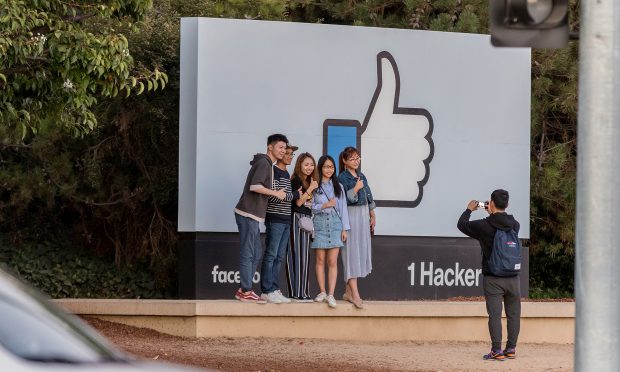On Appeal, Facebook Tries to Snuff Out Class Action Brought Under Illinois Biometric Law
In a case involving Facebook's "tag suggestions" feature, the Ninth Circuit heard arguments Wednesday over whether the collection of an individual's biometric data in violation of the Illinois Biometric Information Privacy Act is sufficient to establish standing in federal court and whether a class action against the social media giant should move forward given the potential billions in damages.
June 12, 2019 at 03:29 PM
4 minute read
 Headquarters for social networking company Facebook Inc. in Menlo Park California. Photo: Jason Doiy/ALM
Headquarters for social networking company Facebook Inc. in Menlo Park California. Photo: Jason Doiy/ALM
Is the collection of an individual's biometric data in violation of the Illinois Biometric Information Privacy Act enough to establish standing in federal court?
That's one of the questions that a panel of the U.S. Court of Appeals for the Ninth Circuit grappled with Wednesday in considering whether Facebook should face a federal class action for failing to get written consent from Illinois users before creating facial maps to fuel its “tag suggestions” feature.
Facebook's lawyers at Mayer Brown convinced the Ninth Circuit to pump the breaks on the class action that was poised for trial before U.S. District Judge James Donato last year to consider whether the plaintiffs had standing and whether the case could move forward as a class action given the potential billions in statutory damages at stake.
But on Wednesday Mayer Brown's Lauren Goldman faced a series of pointed questions from judges on the panel—in particular, Circuit Judge Sandra Ikuta and U.S. District Judge Benita Pearson of the Northern District of Ohio sitting by designation—about whether the company had invaded users privacy through the feature launched in 2011, which prompts users to identify friends in pictures uploaded to the social media site.
“We've said there's an interest in privacy that's a concrete interest recognized in the law,” said Ikuta early in Goldman's arguments.
Goldman responded that the court had recognized that right in a case involving ESPN where the network was accused of collecting viewers personally identifiable information and sharing it with analytics companies to build consumer marketing profiles. Facebook's tool, which allows users whom the plaintiffs are already connected with on the social network to identify them in photos, makes no such disclosure, Goldman contended.
But Ikuta responded that the tool worked “sort of like CSI” and later noted that the U.S. Supreme Court had advised courts to look at “technologically-enhanced invasions of privacy” differently since they “can multiply the effect of what a normal human can do.”
Pearson added that a recent decision by the Illinois Supreme Court, where the state's high court found that plaintiffs don't need to allege any harm beyond a statutory violation to sue under BIPA, “presumably answered the question that Facebook poses” about standing.
But Goldman argued that in federal court “a preventative lawsuit is not sufficient absent a showing of impending harm.” People who don't have standing can't recover damages in federal court, she added.
Pearson, however, noted that Facebook had disabled the feature in Canada and other places where it arguably runs afoul of local regulations. “Why don't you just stop doing it in Illinois?” she asked.
Goldman responded that the company thinks that its disclosure to users, which gives them the option of disabling the feature for their photos, complies with the law and that BIPA was never meant to apply to software like Facebook's.
Arguing for the plaintiffs, J. Aaron Lawson of Edelson said that Facebook's failure to get written consent had deprived his clients of “the meaningful right to say no to the collection of this information.”
Ikuta, however, noted that that privacy right that plaintiffs were asking the court to recognize didn't fall directly in line with traditional common law.
Ikuta said there's “not a common law right to not have your face mapped and stored.”
This content has been archived. It is available through our partners, LexisNexis® and Bloomberg Law.
To view this content, please continue to their sites.
Not a Lexis Subscriber?
Subscribe Now
Not a Bloomberg Law Subscriber?
Subscribe Now
NOT FOR REPRINT
© 2025 ALM Global, LLC, All Rights Reserved. Request academic re-use from www.copyright.com. All other uses, submit a request to [email protected]. For more information visit Asset & Logo Licensing.
You Might Like
View All
Microsoft Becomes Latest Tech Company to Face Claims of Stealing Marketing Commissions From Influencers


TikTok Opts Not to Take Section 230 Immunity Fight to U.S. Supreme Court
4 minute read
PayPal Faces New Round of Claims; This Time Alleging Its 'Honey' Browser Extension Cheated Consumers
Trending Stories
- 1With DEI Top of Mind, Black Judges Discuss Growing Up During Segregation, Efforts to Diversify the Profession
- 2Big Law's Middle East Bet: Will It Pay Off?
- 3'Translate Across Disciplines': Paul Hastings’ New Tech Transactions Leader
- 4Milbank’s Revenue and Profits Surge Following Demand Increases Across the Board
- 5Fourth Quarter Growth in Demand and Worked Rates Coincided with Countercyclical Dip, New Report Indicates
Who Got The Work
J. Brugh Lower of Gibbons has entered an appearance for industrial equipment supplier Devco Corporation in a pending trademark infringement lawsuit. The suit, accusing the defendant of selling knock-off Graco products, was filed Dec. 18 in New Jersey District Court by Rivkin Radler on behalf of Graco Inc. and Graco Minnesota. The case, assigned to U.S. District Judge Zahid N. Quraishi, is 3:24-cv-11294, Graco Inc. et al v. Devco Corporation.
Who Got The Work
Rebecca Maller-Stein and Kent A. Yalowitz of Arnold & Porter Kaye Scholer have entered their appearances for Hanaco Venture Capital and its executives, Lior Prosor and David Frankel, in a pending securities lawsuit. The action, filed on Dec. 24 in New York Southern District Court by Zell, Aron & Co. on behalf of Goldeneye Advisors, accuses the defendants of negligently and fraudulently managing the plaintiff's $1 million investment. The case, assigned to U.S. District Judge Vernon S. Broderick, is 1:24-cv-09918, Goldeneye Advisors, LLC v. Hanaco Venture Capital, Ltd. et al.
Who Got The Work
Attorneys from A&O Shearman has stepped in as defense counsel for Toronto-Dominion Bank and other defendants in a pending securities class action. The suit, filed Dec. 11 in New York Southern District Court by Bleichmar Fonti & Auld, accuses the defendants of concealing the bank's 'pervasive' deficiencies in regards to its compliance with the Bank Secrecy Act and the quality of its anti-money laundering controls. The case, assigned to U.S. District Judge Arun Subramanian, is 1:24-cv-09445, Gonzalez v. The Toronto-Dominion Bank et al.
Who Got The Work
Crown Castle International, a Pennsylvania company providing shared communications infrastructure, has turned to Luke D. Wolf of Gordon Rees Scully Mansukhani to fend off a pending breach-of-contract lawsuit. The court action, filed Nov. 25 in Michigan Eastern District Court by Hooper Hathaway PC on behalf of The Town Residences LLC, accuses Crown Castle of failing to transfer approximately $30,000 in utility payments from T-Mobile in breach of a roof-top lease and assignment agreement. The case, assigned to U.S. District Judge Susan K. Declercq, is 2:24-cv-13131, The Town Residences LLC v. T-Mobile US, Inc. et al.
Who Got The Work
Wilfred P. Coronato and Daniel M. Schwartz of McCarter & English have stepped in as defense counsel to Electrolux Home Products Inc. in a pending product liability lawsuit. The court action, filed Nov. 26 in New York Eastern District Court by Poulos Lopiccolo PC and Nagel Rice LLP on behalf of David Stern, alleges that the defendant's refrigerators’ drawers and shelving repeatedly break and fall apart within months after purchase. The case, assigned to U.S. District Judge Joan M. Azrack, is 2:24-cv-08204, Stern v. Electrolux Home Products, Inc.
Featured Firms
Law Offices of Gary Martin Hays & Associates, P.C.
(470) 294-1674
Law Offices of Mark E. Salomone
(857) 444-6468
Smith & Hassler
(713) 739-1250






